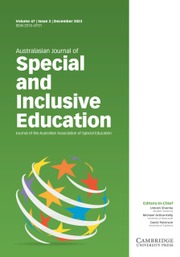Article contents
Implications for Conducting Special Education Research Drawn From the Reflexive Accounts of a Deaf With Disabilities Professor and Three Student Researchers
Published online by Cambridge University Press: 07 July 2020
Abstract
A Deaf with disabilities (DWD) male professor, 2 hearing female teacher candidates, 11 parents (4 of whom were immigrants), and 6 DWD children sought to better understand the experiences of parents of DWD children by conducting an ethnographic study (Singer, Kamenakis, Shapiro, & Cacciato, in press). The research team recorded reflexive journals as a way to analyse their methodology. In this essay, we reflect on 3 themes developed from the reflexive journals: (a) researcher positionality, (b) negotiating power in research, and (c) language variation in practice. We discuss our experiences and contextualise these accounts within relevant scholarship, attempting to locate some amount of resolution to the very human experiences upon which we reflect. We provide key takeaways for doing research with and among people with disabilities in special educational settings, particularly focusing on people who communicate in nonnormative ways. We conclude with a culminating discussion of the significance of creating emancipatory special education research.
- Type
- Original Articles
- Information
- Australasian Journal of Special and Inclusive Education , Volume 44 , Issue 2 , December 2020 , pp. 73 - 87
- Copyright
- © The Author(s) 2020
Footnotes
This manuscript was accepted under the Editorship of David Paterson.
References
- 1
- Cited by


